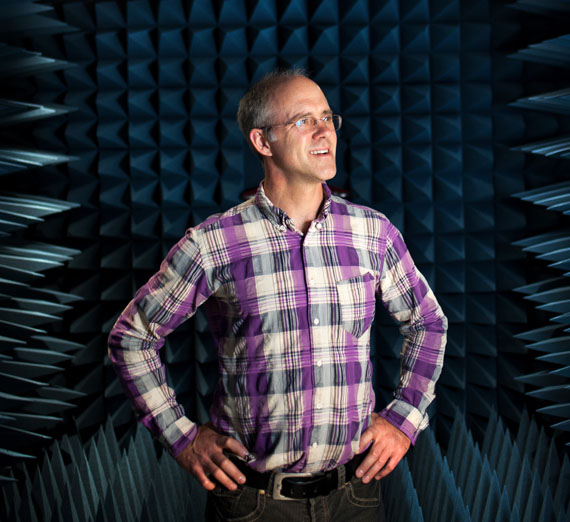GU's Largest Federal Research Grant Funds Smart Antenna, Radio Lab

By Peter Tormey
SPOKANE, Wash. — Gonzaga University electrical engineering Associate Professor Steve Schennum's latest work with "smart antennas" captivated approximately 150 of the world's top experts in wireless communications earlier this month. The scientists, in town for an international engineering conference, toured Gonzaga's new Smart Antenna and Radio Lab (SARL).
Schennum recently received a $1.1 million award from the National Science Foundation, Gonzaga's largest federal research grant ever, to develop new ways to help meet the world's seemingly insatiable demand for reliable and secure high-bandwidth wireless communications. Specifically, Schennum is developing new ways to send more data wirelessly, and to send it faster. His work has widespread commercial and emergency applications.
For example, the technology is critical for first-responders such as police and fire-rescue units. Its commercial applications range from smart phones to underground mining communications to smart-energy applications that self-report customers' utility usage. Future applications envisioned include systems to conserve household energy through integration with a so-called "smart grid," allowing customers to use energy when demand is low, saving money and reducing stress on the electrical grid.
The success and widespread use of wireless systems have caused increased wireless interference, which compromises systems' reliability and bandwidth. Schennum uses highly sophisticated equipment to identify issues causing wireless interference and to resolve those issues.
Already, three Inland Northwest companies are paying to use Gonzaga's SARL, including LHC2, a Liberty Lake-based wireless equipment design, manufacturing and deployment company. Also, the lab will provide collaborative research and educational opportunities for faculty and students at Gonzaga, University of Idaho, Washington State University, Eastern Washington University, Spokane Community College, and others.
